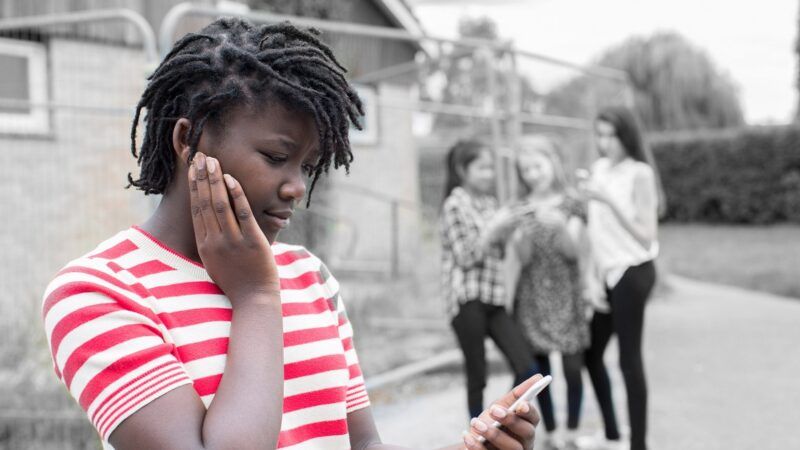Teen Arrested Under Connecticut's Unconstitutional Hate Speech Law for Racist Social Media Post
Calling a classmate a racist slur on Snapchat is offensive. It’s also protected speech.

Folks may not know that Connecticut has a hate speech law, possibly under the completely correct assumption that the First Amendment prohibits the federal government and states from enacting them.
Nevertheless, a 16-year-old white high school student in Fairfield, Connecticut, has been arrested and charged with "ridicule on account of creed, religion, color, denomination, or race" for a Snapchat post where the teen displayed a picture of a black classmate and reportedly captioned it with a racial slur and racist comments. Violating this 1917 law is a misdemeanor with a potential $50 fine and a possible jail sentence of up to 30 days. The student has also been charged with breach of the peace.
The teen's name has not been released. According to WABC's coverage of the incident, the student posted a picture of classmate Jamar Medor and called Medor the N-word, adding, "Why is he not in chains?" Medor and his mother, Judith, spoke out about the offensive post, and Medor's mother wants the offender expelled from the school.
Associated Press reporter Dave Collins has taken an unfortunate "experts say" approach to discussing the underlying law used to justify the teen's arrest. He quotes Emerson Sykes, a senior attorney with the American Civil Liberties Union, pointing out that this Connecticut law is unconstitutional. Sykes says, "Having racist ideas or sharing racist ideas is something that we actually protect. Even if that viewpoint is offensive, even if it's deplorable, we don't want the government making the call about what's OK to say and think and what is not."
Sykes is absolutely factually correct here, but Collins treats this as just one expert opinion among many. He gives equal space to Rev. D. Stanley Lord, president of the Greater Bridgeport NAACP. Lord's organization supports criminal charges for the Snapchat post. Lord told the A.P., "We have to send a strong message that behavior like this won't be tolerated in any school system."
Whether school systems have the authority to punish offensive messages posted off campus is a completely separate matter currently being considered by the Supreme Court. Arresting the teen and charging that teen with a crime is indisputably a violation of the teen's First Amendment rights, and Connecticut's law should be struck down as unconstitutional.
Hate speech is protected speech in America. Citizens cannot be charged with a crime for expressing racist opinions. People can call for hate crime punishments all they want, but the First Amendment, as written and currently enforced, simply doesn't allow them.
UCLA law professor Eugene Volokh has been watching the case and researched the application of the Connecticut law. He notes that the wording of the law actually suggests it's only supposed to apply to advertisements, not broad speech. But Volokh looked over cases where the law has been applied, and it has never been used in that fashion. It is instead used against people using racist or religious slurs in confrontations.
Volokh observes that the law is inherently unconstitutional because it suppresses speech on the basis of content and viewpoint, reminding us that "there's no First Amendment exception for speech that insults on the basis of race or religion."
The A.P. notes that last year lawmakers introduced a bill that would have repealed the law, but it died after the COVID-19 pandemic caused the state legislature to end the session early. In 2019, two college students were charged with violating the law after they were heard saying a racial slur while walking through the parking lot of a dorm. The two students agreed to probation which should ultimately end with the charges being purged.
But they shouldn't have been arrested at all, and this high school student shouldn't have been arrested either. That doesn't mean parents and the school should necessarily turn a blind eye to a teen's racist ranting. But that a leader of the NAACP is actually calling for the arrest of a teen for speech is profoundly and shockingly ignorant of the role policing in schools has played in destructively dragging minority kids into the criminal justice system for petty reasons.
